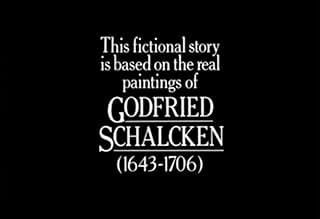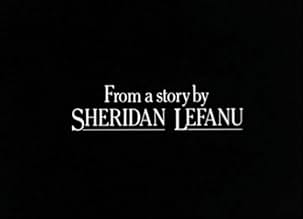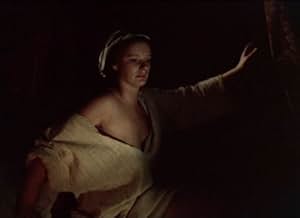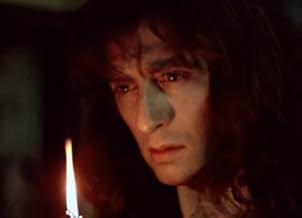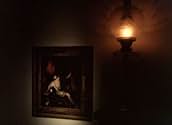Can Schalcken save his love, Rose, from the clutches of a ghastly suitor before it is too late?Can Schalcken save his love, Rose, from the clutches of a ghastly suitor before it is too late?Can Schalcken save his love, Rose, from the clutches of a ghastly suitor before it is too late?
- Director
- Writers
- Stars
Sarah Parry
- Model
- (uncredited)
- Director
- Writers
- All cast & crew
- Production, box office & more at IMDbPro
Featured reviews
I agree entirely that Schalken the Painter should be released on video/DVD. I have raved about it for over 20 years to my family, none of whom has had the opportunity to judge for themselves.
And it's such a shame that Cheryl Kennedy has not been seen on screen for much of that time. The narration of Charles Gray is beautifully judged and the interiors are stunningly lit.
And it's such a shame that Cheryl Kennedy has not been seen on screen for much of that time. The narration of Charles Gray is beautifully judged and the interiors are stunningly lit.
10Beeryus
Only the BBC has the ability to outdo great writers, and even then, only rarely (Ashenden was one example, Jeeves and Wooster another). Here is one of the best examples: a classic BBC TV play adapted from J. Sheridan LeFanu's chilling short story of the same name.
The atmosphere of this TV film is incredibly disturbing, and the cast and crew all do a brilliant job to recreate one of the most chilling stories of gothic literature. Godfried Schalcken was a real painter who studied under Gerrit Dou in Leiden (Holland). Schalcken painted figures lit by candlelight, and his paintings are quite atmospheric. It is this dark atmosphere which suffuses LeFanu's work and this TV play. After seeing the movie, I took a trip to Europe, and had the chance to see some of the original paintings. They are brilliant in their depiction of light, shadow, and darkly captivating mood.
The TV play is a kind of allegory and a mystery, in which a young maiden (a rare appearance by the lovely and talented Cheryl Kennedy) is married off to a mysterious suitor and disappears. It falls to Schalcken (played brilliantly by Jeremy Clyde), who had used the girl as a model, to investigate. The horror that he uncovers haunts him (and his subsequent artworks) forever.
Unfortunately, like many late-night TV plays that were prevented from making it to VHS by a reactionary '70s era British VHS censorship debacle (the play features a very brief frontal nude scene, performed quite eerily by Cheryl Kennedy), this TV classic is now apparently lost. It has not been seen on TV for over a decade (as far as I'm aware), and like many '70s BBC masterpieces, seems destined to spend decades completely forgotten in some film vault. We can only hope that someone at the BBC will eventually find it and get the powers that be to release it on DVD or VHS. Hopefully soon!
The atmosphere of this TV film is incredibly disturbing, and the cast and crew all do a brilliant job to recreate one of the most chilling stories of gothic literature. Godfried Schalcken was a real painter who studied under Gerrit Dou in Leiden (Holland). Schalcken painted figures lit by candlelight, and his paintings are quite atmospheric. It is this dark atmosphere which suffuses LeFanu's work and this TV play. After seeing the movie, I took a trip to Europe, and had the chance to see some of the original paintings. They are brilliant in their depiction of light, shadow, and darkly captivating mood.
The TV play is a kind of allegory and a mystery, in which a young maiden (a rare appearance by the lovely and talented Cheryl Kennedy) is married off to a mysterious suitor and disappears. It falls to Schalcken (played brilliantly by Jeremy Clyde), who had used the girl as a model, to investigate. The horror that he uncovers haunts him (and his subsequent artworks) forever.
Unfortunately, like many late-night TV plays that were prevented from making it to VHS by a reactionary '70s era British VHS censorship debacle (the play features a very brief frontal nude scene, performed quite eerily by Cheryl Kennedy), this TV classic is now apparently lost. It has not been seen on TV for over a decade (as far as I'm aware), and like many '70s BBC masterpieces, seems destined to spend decades completely forgotten in some film vault. We can only hope that someone at the BBC will eventually find it and get the powers that be to release it on DVD or VHS. Hopefully soon!
This visual adaptation of Joseph Sheridan le Fanu's short story is, as I remember, as faithful to the pace and tone of the original work as any film I've come across. As compelling as the story, and lit in a way evocative of Vermeer and Schalken, it proceeds with an attention to static detail and earthiness that one normally associates with Dutch interior pictures of the 17th century, adding to this already addictive blend the grim inevitability of a supernaturally sinister social deal based on personal gain. Anyone interested in this period of Dutch history will gain much enjoyment from this film - paradoxes abound in this curious world of high art, dedication, order, status, lust, pecuniary gain, moral, (and physical), corruption. Truly a lost masterpiece.
I saw it and taped it when it went out and have never forgotten it. Sadly that was on Betamax in a former life. I agree entirely with everyone's observations on the piece.
And I have seen the original painting. Many years ago I was stood in the doorway of a huge room in an English stately home, listening to the information being given by the guide when I casually glanced to my left.
This was a very warm summer's day but my blood froze. I was resting against a wall covered in paintings and there next to my left elbow was the very painting of the girl shielding the candle, with her ghastly suitor's face in the shadows...
I can't remember which house it was though it might have been Woodstock near Oxford. But I will never forget that shock! The piece, from the Omnibus series, does still exist as a print so there is still hope...
And I have seen the original painting. Many years ago I was stood in the doorway of a huge room in an English stately home, listening to the information being given by the guide when I casually glanced to my left.
This was a very warm summer's day but my blood froze. I was resting against a wall covered in paintings and there next to my left elbow was the very painting of the girl shielding the candle, with her ghastly suitor's face in the shadows...
I can't remember which house it was though it might have been Woodstock near Oxford. But I will never forget that shock! The piece, from the Omnibus series, does still exist as a print so there is still hope...
In 1665 Leiden, Dutch art is renowned the world over as budding artist Godfried Schalcken(Jeremy Clyde) takes up a students role under the tutorship of esteemed artist Gerrit Dou(Maurice Denham), himself a student of Rembrandt van Rijn. Schalcken's days are spent in Dou's home, painting in oils the content of classical heritage that Dou presents before him. Here in Dou's home and without his knowledge, Schalcken falls for Dou's niece, Rose Velderkaust, but they both know that their relationship may never blossom as Schalcken has no income and could not possibly take care of her and as such Dou's consent is unlikely. One evening a tall and sickly pale man calls on Dou's home, there he briefly introduces himself to Schalcken as a Mr Vanderhausen of Rotterdam and tells him he will call the following night to seek a meeting with his master Gerrit Dou. Vanderhausen duly arrives the following night carrying a casket, he requests Dou to get the contents valued by a goldsmith straight away, so that their business can be done without haste. While Schalcken is gone, Vanderhausen immediately gets down to business, he tells Dou that he once saw his niece in a church in Rotterdam and that he has now come to ask for her hand in marriage, he demands his signature to his consent that same night and will not give Dou any time to decide, he must decide immediately, in return he gets the contents of the casket. When Schalcken returns with the valuation, Dou can't but be impressed and despite his love for Rose, greed overtakes him and he acquiesces and signs the papers. Rose in naturally none too impressed when she meets the deathly Vanderhausen and pleads with Schalcken to elope with her, he again states his love for her, but again claims his poverty prevents him from doing so, but he pledges that when he is wealthy he will buy her back at twice the price. Rose departs with her new fiancé and is not seen again. Schalcken agrees to go to Rotterdam to find her and check on her health, he tracks her movements to that same church in Rotterdam, where he learns from a local carriage driver that brought them there that night, that the odd couple had entered the church but had never came out and when he had searched the church, had found nobody. Schalcken returns with the bad news and from here on settles himself back into his work.
Many years pass and Schalcken is now as famous as his mentor, he still works with the now elderly Dou, who despite his wealth can't help but feel cheated on the deal, never quite getting over her loss. Suddenly one night, a ravished Rose appears back home, in fear and crying that "The Dead and the living can never be one" and pleading not to be left alone and calling for a Man of God to be dispatched to save her soul, but who or what has put her in this distress?
So who was Godfried Schalcken? Well he was a real painter of modest renown, he painted in oils in the style of the time, his work reminiscent to the untrained eye (my own included) as mimicking that of Vermeer, Rembrandt and his Mentor Dou. At some point his work altered, the content of his work not mirroring his perceived life, what was it that altered his thinking, is this period reflective of some radical event in his life? His work it is claimed lacked any human intimacy, the figures within usually caught up in some kind of monetary transaction and usually lit by candlelight as if something dark is lurking in the darker corners of his work. This Omnibus adaptation is of Sheridan le Fanu's short story The Strange Event in the life of Schalcken the Painter. based on tales told to him by an acquaintance of his, one Captain Vandael, or so the story goes. Needless to say the reasons for his altered work style, are given some elaboration within the film, suffice to say that it involves tragedy and a supernatural experience, to say more could spoil someone's viewing. The events contained within are not clearly defined however and the viewer is given plenty of leeway to come up with their own ideas as to who for instance Vanderhausen was, a man or monster? was he in fact alive or dead? Looking at the work of Schalcken, one can see why le Fanu was immediately struck by his work and why he decided to write this story based on real events. There is so little light and so much shade and utter darkness in his work, the darker corners of his paintings only giving the merest hints at what menace lurks there, that his work just shouts out to be discussed and what better place to do it, than in a ghost story. As this was part of the Omnibus series, that also spawned Whistle and I'll come to you, it isn't a straight forward drama, its more a docu-drama, which is superbly narrated by the wonderful Charles Gray, its also a fine period drama, that seems to capture plenty of culture and atmosphere of the time. Visually it mirrors the artistic works of the time, with each frame seeming like a living moving painting, obviously as a TV production, there are budgetary constraints that limit just how authentic it can be and given these factors director and writer Leslie Megahey does a fine job of recreating that mood. You might be asking, so where's the Horror? well, its true that there isn't a whole lot going on, the horror is for the most part implied, we the viewer are given some facts and are asked to fill in the gaps and as such we might all have differing views on what went on, but it's a damn good drama/ghost story that's finely acted by all concerned.
Many years pass and Schalcken is now as famous as his mentor, he still works with the now elderly Dou, who despite his wealth can't help but feel cheated on the deal, never quite getting over her loss. Suddenly one night, a ravished Rose appears back home, in fear and crying that "The Dead and the living can never be one" and pleading not to be left alone and calling for a Man of God to be dispatched to save her soul, but who or what has put her in this distress?
So who was Godfried Schalcken? Well he was a real painter of modest renown, he painted in oils in the style of the time, his work reminiscent to the untrained eye (my own included) as mimicking that of Vermeer, Rembrandt and his Mentor Dou. At some point his work altered, the content of his work not mirroring his perceived life, what was it that altered his thinking, is this period reflective of some radical event in his life? His work it is claimed lacked any human intimacy, the figures within usually caught up in some kind of monetary transaction and usually lit by candlelight as if something dark is lurking in the darker corners of his work. This Omnibus adaptation is of Sheridan le Fanu's short story The Strange Event in the life of Schalcken the Painter. based on tales told to him by an acquaintance of his, one Captain Vandael, or so the story goes. Needless to say the reasons for his altered work style, are given some elaboration within the film, suffice to say that it involves tragedy and a supernatural experience, to say more could spoil someone's viewing. The events contained within are not clearly defined however and the viewer is given plenty of leeway to come up with their own ideas as to who for instance Vanderhausen was, a man or monster? was he in fact alive or dead? Looking at the work of Schalcken, one can see why le Fanu was immediately struck by his work and why he decided to write this story based on real events. There is so little light and so much shade and utter darkness in his work, the darker corners of his paintings only giving the merest hints at what menace lurks there, that his work just shouts out to be discussed and what better place to do it, than in a ghost story. As this was part of the Omnibus series, that also spawned Whistle and I'll come to you, it isn't a straight forward drama, its more a docu-drama, which is superbly narrated by the wonderful Charles Gray, its also a fine period drama, that seems to capture plenty of culture and atmosphere of the time. Visually it mirrors the artistic works of the time, with each frame seeming like a living moving painting, obviously as a TV production, there are budgetary constraints that limit just how authentic it can be and given these factors director and writer Leslie Megahey does a fine job of recreating that mood. You might be asking, so where's the Horror? well, its true that there isn't a whole lot going on, the horror is for the most part implied, we the viewer are given some facts and are asked to fill in the gaps and as such we might all have differing views on what went on, but it's a damn good drama/ghost story that's finely acted by all concerned.
Did you know
- TriviaVincent Price was a front runner for The Narrator. Peter Cushing was offered the part but rejected the project as distasteful.
- Goofs14 minutes in, as Schalcken abandons his painting and walks towards Rose, Jeremy Clyde's footsteps on the floor are not in synch with the footsteps we hear.
- Quotes
Narrator - Lefanu: In short, Schalcken was in love... as much as a Dutchman can be.
- SoundtracksIn Nomine
(uncredited)
Music by John Bull
Details
- Release date
- Country of origin
- Language
- Also known as
- Schalcken, o Pintor
- Filming locations
- BBC Ealing Studios, Ealing, London, England, UK(Gerrit Dou's studio and all exteriors)
- Production company
- See more company credits at IMDbPro
Contribute to this page
Suggest an edit or add missing content


